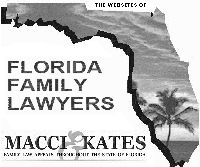|
|
|
LISA MARIE MACCI, P.A.  Suite 324 Atrium
Suite 324 Atrium2255 Glades Road Boca Raton, FL 33431 561-252-8528 Palm Beach Divorce Lawyer 28 years experience |
ELIZABETH J. KATES, ESQ.  4411 NW 10th Street
4411 NW 10th Street (Coconut Creek) Pompano Beach, FL 33066 954-979-8783 Broward County Family Lawyer 36 years experience |

Trial-level cases in South Florida's Miami-Dade, Broward, and Palm Beach Counties
Florida appeals from family courts in all circuites and counties: First Circuit - Escambia, Okaloosa, Santa Rosa and Walton; Second Circuit - Franklin, Gadsden, Jefferson, Leon, Liberty, and Wakulla; Third Circuit - Columbia, Dixie, Hamilton, Lafayette, Madison, Suwannee and Taylor; Fourth Circuit - Clay, Duval and Nassau; Fifth Circuit - Citrus, Hernando, Lake, Marion and Sumter; Sixth Circuit - Pasco and Pinellas; Seventh Circuit - Flagler, Putnam, St. Johns and Volusia; Eighth Circuit - Alachua, Baker, Bradford, Gilchrist, Levy, and Union; Ninth Circuit - Orange and Osceola; Tenth Circuit - Hardee, Highlands, and Polk; Eleventh Circuit - Miami-Dade; Twelfth Circuit - DeSoto, Manatee, and Sarasota; Thirteenth Circuit - Hillsborough; Fourteenth Circuit - Bay, Calhoun, Gulf, Holmes, Jackson and Washington; Fifteenth Circuit - Palm Beach; Sixteenth Circuit - Monroe; Seventeenth Circuit - Broward; Eighteenth Circuit - Brevard and Seminole; Nineteenth Circuit - Indian River, Martin, Okeechobee and St. Lucie; Twentieth Circuit - Charlotte, Collier, Glades, Hendry and Lee

"This is nothing less than a travesty... compounded in my opinion by the Court system itself and I am saddened by it... But the only expert that I found to be credible...
"I found Dr. Klass to be particularly credible...
"The testimony of the witnesses called by the father -- Dr. Hohnecker, Dr. [Martha] Jacobson, Ms. Lippman -- as far as this Court is concerned, I found them to be biased, I found them to have a lack of objectivity... insincere and disingenuous and fueled by money...
"The way this case should have been handled... at the time the father filed the petition was either to deny it or to do something that would have been productive... instead, this child at best and its licensed psychologist [ed: Laura Hohnecker] who is supposedly the head of this so-called team... says well, she's improving because now she blinks at dad and will occasionally laugh... If that's what we're reduced to, I don't want to be a part of this... to remove a seven year old child from the primary bonded custodial parent...
"I find... that the evidence presented does not meet one or more of the criteria stated in Section 39.402(1), and I am ordering in accordance with the dictates of the 4th District Court of Appeal ...return the child to the mother's custody..." --
04/05/12, Palm Beach County Juvenile Court.
Read more...![]() Rorschach Psychological Test...
Rorschach Psychological Test...
Are Psychologists Hiding a Lack of Expertise?
When You Should Just Walk Out
Also see: MMPI-2 in Child Custody Evaluations: Can't Say

The listed unfair
practices and subjective distortions of objective custody
criteria are culled from recent literature and from reviewing 30 years of doing custody evaluations.
The list of 10 basically unacceptable assessment practices also comes from hearing the most
commonly voiced complaints by attorneys, judges, parents, and custody experts about custody evaluations.
1. Judgmental attitude by suggesting punitive and unreasonable consequences for
a parent not abiding by the evaluator's arbitrary edicts...
![]() Bad Custody Evaluations
by Joel V. Klass, M.D.
Bad Custody Evaluations
by Joel V. Klass, M.D.
 The purpose of listing the following 10 questionable characteristics found in custody evaluations is
to help eliminate commonly found inadequacies and biases influencing custody determinations.
The purpose of listing the following 10 questionable characteristics found in custody evaluations is
to help eliminate commonly found inadequacies and biases influencing custody determinations.
![]() Considering Collaborative Law
by Elizabeth J. Kates, Esq.
Considering Collaborative Law
by Elizabeth J. Kates, Esq.

Before committing to use the collaborative process, and before holding the initial four-way meeting, a lawyer and his or her client must carefully -- and privately -- consider whether the case is appropriate for an attempted collaborative dispute resolution. The lawyer must objectively, fully, and fairly inform the client of not only the potential advantages of collaborative law, but also the potential disadvantages and risks.
The process is designed such that it is a firm commitment: if it does not work, both of the collaborative lawyers must withdraw -- and may not represent their clients in litigation. This may or may not entail risks, depending on the facts of the case...